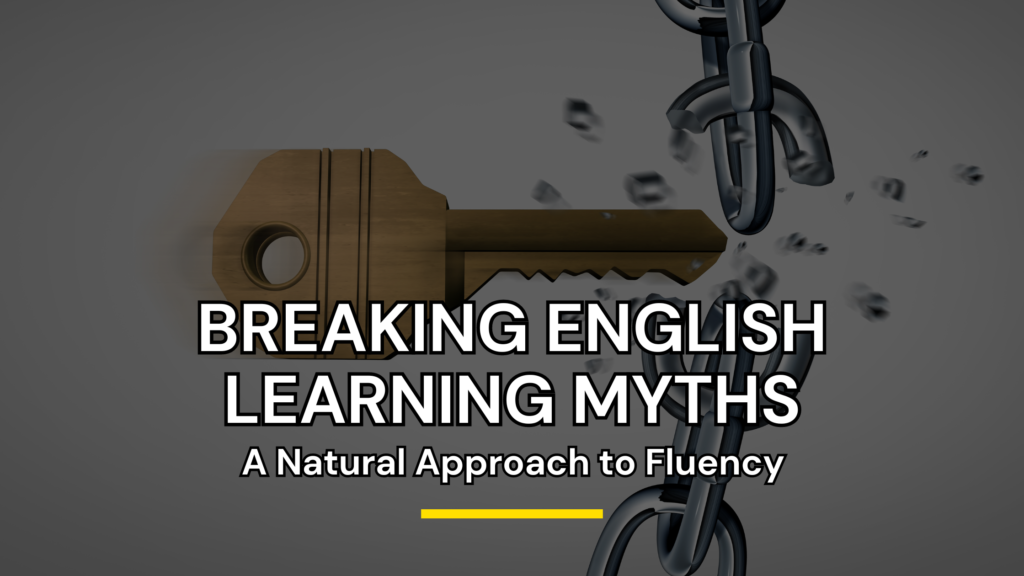In India, English is often treated more as an academic subject than as a language. This obsession has led to several misconceptions about how to master it. Contrary to popular belief, memorizing a new word daily or focusing on complex vocabulary is not the path to fluency. English should be acquired naturally, just as we learn our mother tongue.
The Misconception of Vocabulary Learning
It is widely believed that expanding your vocabulary by learning a new word each day or mastering phrases will make you sound fluent. However, in India, only 2% of the population speaks English professionally, 8% speak broken English, and the remaining can understand but fear speaking it. Most of us know only 300-400 basic words, which puts us at a pre-intermediate level. Using advanced vocabulary in daily conversation is not practical because few people will understand you.
Natural Acquisition of Language
So, how should we learn English? Think about how you learned your native language by listening to those around you. The same principle applies to English. Listening to conversational English helps your brain create vivid images, making it easier to remember phrases and words.

Practical Example
Consider the following conversation between Jaspreet and Pamela:
Jaspreet: Hey Pamela, it’s Jaspreet.
Pamela: Jaspreet, hi! How’s the apartment hunt going?
Jaspreet: Actually, I just signed the lease on an apartment in Flatbush.
Pamela: Flatbush? Isn’t that a sketchy neighborhood?
Jaspreet: Well, it’s a working-class area. Some of the buildings are a little run-down, but
it’s quite safe.
Pamela: Oh, that’s good to hear. So, tell me about your new place!
Jaspreet: I love it! The building is clean and quiet, the appliances in the kitchen are all brand-new, and there are huge windows that let in a lot of natural light. The bathroom is a little cramped, but it doesn’t bother me too much.
Pamela: Is it in one of those high-rise apartment complexes?
Jaspreet: No, it’s in a three-story walk-up. I’ll definitely get my exercise going up and down three flights of stairs every day!
Pamela: Hey, it saves you money on a gym membership. What’s your commute like?
Jaspreet: It’s great, just twenty minutes.
Pamela: Lucky you! Do you have a roommate?
Jaspreet: Nope – I like having the place to myself. So tell me, how’s life in the suburbs treating you?
Pamela: It’s pretty nice. We’re renting a very spacious house for a fraction of what we used to pay in New York. It has a huge backyard, which is great for the kids to play in. You’re welcome to visit anytime you need a break from the city.
Jaspreet: Thanks – I’ll definitely take you up on that sometime!
This dialogue shows the natural flow of conversation and introduces useful phrases and vocabulary related to “Where Do They Live”
Key Vocabulary and Phrases Meaning
- Hunt going: The progress or status of a search or quest, in this context, for an apartment.
- Sketchy: Slang for not well-maintained and possibly unsafe.
- Working-class area: A neighborhood where residents typically have low-paying jobs.
- Cramped: Small and uncomfortable.
- Three-story walk-up: A building with three floors and no elevator.
- Commute: The trip from home to work.
- Suburbs: Residential areas on the outskirts of a city.
- For a fraction: For a much smaller amount.
- I’ll definitely take you up on that sometime!: I’ll accept your invitation/offer at some point in the future.
Conclusion:
Learning English should be a natural process. Listen to English conversations daily, even if you don’t understand everything at first. Gradually, you’ll become more comfortable and start picking up phrases and words naturally.
Remember, our brain processes information through vivid images created by listening, which aids in retention and understanding.
Learn a new word every day to enhance your vocabulary.
Learn phrases to sound like a native speaker.
Read the newspaper daily, underline unknown words, and check their meanings.
Master grammar rules and tenses to speak English fluently.
The next time someone suggests these rigid methods of learning English, confidently say, “No, I am not going to listen to your suggestion.”
English is a language, not a subject, and should be learned as naturally as our mother tongue...
For Corporate Trainings:- Contact – +91 8754418571 / Mail: asksutanu@gmail.com


Using interactive lessons, real-world conversation practice, and personalized feedback, this blog demonstrates how online English-speaking courses can accelerate fluency.
Thank you so much for your kind words. It means a lot!